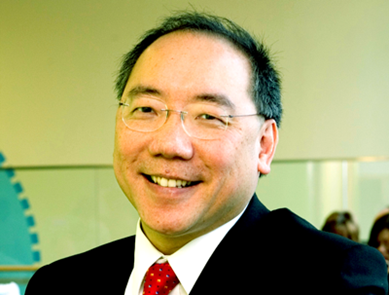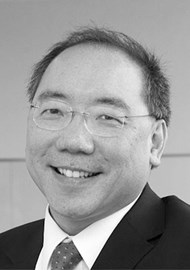In the second of our interviews in this series, Eye News speaks to Professor Sir Peng Tee Khaw, Professor of Glaucoma and Ocular Healing, Consultant Ophthalmic Surgeon, Director of the National Institute for Health Research, Biomedical Research Centre at Moorfields Eye Hospital and the UCL Institute of Ophthalmology, Director of Research and Development at Moorfields Hospital UCL Partners Director of Eyes and Vision, and Knight of the Realm.

Professor Sir Peng Tee Khaw.
You received the first knighthood in ophthalmology in 50 years. Can you explain how it came about? What did you say to the Queen?
I had no idea that I had been proposed for an honour. The first I knew about it was when I received a letter from the Cabinet Office just after I returned home from the Association for Research in Vision and Ophthalmology (ARVO) meeting in Seattle, USA, having just completed my term as the first UK President of ARVO. I was still jet lagged and thought I must be dreaming when I read the letter with the news that the Prime Minister had recommended to the Queen that I receive a knighthood.
I subsequently discovered that I had been proposed for an honour by the different institutions and organisations I work at, and with support from many others, including patients I look after. I don’t know what was said in the nomination, but the citation includes mention of promoting ophthalmology, research in glaucoma, developing and teaching better techniques including the Moorfields Safer Surgery System to improve glaucoma surgery and clinical outcomes around the world, and raising funding for research and buildings (>£100 million to date). This includes the NIHR Biomedical Research Centre, the NIHR Clinical Research Facility and the Children’s Eye Centre, which are the largest of their kind in the world.
The investiture at Buckingham Palace was a wonderful occasion, with a ceremony that obviously carries such history and tradition. Despite the scale of the event, there was an incredibly personal feel at the ceremony, which was conducted by Prince Charles. He congratulated me on the knighthood and then we had a discussion about all the different aspects of the work I do, including the research into surgery and tissue repair and regeneration, and the fundraising, of which he was very well informed.
By coincidence, I returned to Buckingham Palace the same evening, as I am on the scientific advisory board of the Queen Elizabeth Diamond Jubilee Trust, which was set up to celebrate the Queen’s 60 years on the throne. The Trust will raise and spend up to £100 million in the Commonwealth, and I am pleased to say that up to 80% of this will be to create sustainable infrastructure to treat blinding eye diseases such as trachoma, diabetes and retinopathy of prematurity. I had a very pleasant conversation with Her Majesty about the investiture that day as well as about eye diseases.
How has the knighthood altered your perspective professionally and personally?
It has not really changed. As I said in my statement to the press, my overwhelming sense on receiving the news was feeling very humbled personally but also proud to receive this on behalf of my colleagues in ophthalmology, who improve the lives of so many people in the UK and all over the world.
It does, however, increase the responsibility I feel as the only knight currently actively involved in clinical and academic ophthalmology, although I very much hope there will be more in the future. The knighthood does help to open some doors for ophthalmology, and it is my responsibility to use these opportunities to promote the importance of ophthalmology and eye health to everyone who will listen, in the UK and around the world.
Do you find you get treated differently as a Knight of the Realm? Are there any downsides?
A knighthood is something that people know about all around the world for historical reasons, so it clearly has interest value. Although there are many different knighthood equivalents around the world, the British knighthood seems to be one of the most recognised across the globe. People will often ask me all about the knighthood and it is a very nice way to begin conversations. I still find it odd when people address me as Sir Peng!
With regards to downsides – none significant so far, but I worry that people might occasionally hesitate to approach me because of the title. Hopefully, they will realise that I am still unchanged and as friendly as before.
Who has inspired you in your career and why? Who have been your heroes and mentors? Who, in the wider world, do you admire?
From the beginning, I have been inspired by my father and mother. Both came from very humble backgrounds and had to endure great sacrifices overcoming great hardships to give their children an education and opportunities in our lives. It puts into perspective anything we think we achieve. They also taught me that you have to have passion about whatever you do, but to couple that with compassion.
I have been extremely fortunate to have had many wonderful mentors – more than I can mention in this space. From John Garfield, who taught me how to listen to patients and make diagnoses purely on clinical history and examination, to Andrew Elkington at Southampton who sadly has just passed away, to Ian Grierson and Greg Schultz who took a clinical trainee into their labs and taught him science, and my clinical mentors Roger Hitchings and Noel Rice, who taught me so much that I still use today.
“...proud to receive this on behalf of my colleagues in ophthalmology, who improve the lives of so many people in the UK and all over the world.”
I have been fortunate enough to meet many extraordinary people in my work and fundraising activities, including some people who have greatly influenced and are reshaping the world we live in. I really admire individuals who overcome adversity and make a difference to other people. I include my patients who amaze me and provide me with so much of my inspiration for what I do in life.
What has been the best piece of advice that you have received in your career? What advice would you offer to those following in your footsteps?
Do something that you are inspired by and believe in. I went into laboratory research and did my PhD very late in my career, right at the end of my training. I was inspired, as a senior registrar at Moorfields, to do this by a child with glaucoma who I admitted to hospital, she had had many operations, all of which had failed. In the end, she went blind and there was nothing I or we could do, despite all our efforts. I went on to develop better and safer glaucoma surgery techniques, even though the ‘translational’ work that I was doing at the time was not very popular or fundable.
I now look after these children and adults with advanced glaucoma, and their outcomes are transformed, often with simple techniques and drugs that we could have had at the time when we were not able to help that first child. All the other things that I have been able to achieve have arisen from that original desire to make a difference in one particular area.
My advice is that, even in this day and age of big teams and projects, you as an individual can still make a real difference if you are inspired and believe in what you are doing.
What are your professional and personal motivations?
To continue working in different roles where I feel I can move things on and make a difference. In particular, I believe passionately in the power of research to change and improve lives here and around the world. Without continued research, we will stagnate and no longer progress. We need to bring forward the next generation who will take on this responsibility.
Back to the specifics, it would be good if glaucoma surgery could move forward towards the next paradigm shift. I have proposed an ‘audacious goal’ for glaucoma, which is the 10-10-10 goal. This is an intraocular pressure of 10mmHg for 10 years achieved in...10 minutes. The reason I have set this is it gives the field a high target which, if achieved at reasonable cost, could transform a group of diseases which has blinded more than seven million people and will continue to do so unless we have a simple ‘curative’ operation, akin to cataract surgery. With multidisciplinary research, this is feasible and must be achieved in the future.
I would also love to see some functional rescue of the very damaged optic nerves in end-stage glaucoma. This is another dream that I now think is achievable with the right resources and multidisciplinary approach.
If you could make every ophthalmologist read one book what would it be and why?
“And, when you want something, all the universe conspires in helping you to achieve it” … is probably the most well-known line from the Alchemist, written by Paul Coelho. Probably a little abstracted from the world of science and ophthalmology but very inspirational. “It’s the possibility of having a dream come true that makes life interesting.” Research, new thoughts and challenges – that’s what makes life fun and interesting.
The research world can be dog eat dog – how have you managed to rise above this?
There is no question that the research world is very competitive and that will not change. However, if you have a deep belief in what you are doing, and couple that with determination, you can succeed. Although you need to know what others are doing, you must not predicate your research just in reaction to others – you need to go your own way. If you are passionate about your research, everyone from funding committees to philanthropic donors can see that and will respond.
What are the challenges to modern clinician researchers and how do you overcome these?
The modern clinician scientist faces many challenges, particularly the surgeon scientist. The necessity to be a first-class researcher and clinician / surgeon is even more difficult now because of the time needed to become sufficiently expert at both. Having said that, the next generation of clinician scientists and what I term scientist clinicians, who understand translational issues, will be critical for the successful translation of basic research into clinical advance. We have to overcome this by having a system that is sufficiently supportive and adaptive to make this possible. There are now many more versatile career schemes to support clinician scientist trainees.
How do you foresee the research landscape changing over next 10 years?
I think we are going into an even more exciting phase of research leading to better ways of managing and reversing visual loss.
I see whole genome information taking us into a new phase of discovery, particularly with the advent of large-scale projects like the 100K genome project. We will see another large increase in our knowledge of important new genes. Using modern molecular and cellular techniques, coupled with high throughput systems borrowed from high-tech industries like computer companies, we will be able to create induced pluripotent cells with particular genetic differences and do massive screening for existing new drugs.
Gene and stem cell therapy will begin to come of age, leading to new possibilities in regenerative medicine. Combinations of new nanotechnologies and bioengineering will boost capabilities in creating new functional ‘hybrid’ devices and tissues, even in complex situations like retinal and optic nerve rescue.
Moving to larger scale data and clinical informatics, if the UK can get this together, this information will enable us to improve research and deliver a new generation of faster, more intelligently planned clinical trials that have a much increased rate of success. This will also improve our ability to improve the pathways and logistics of chronic long-term disease management.
COMMENTS ARE WELCOME





